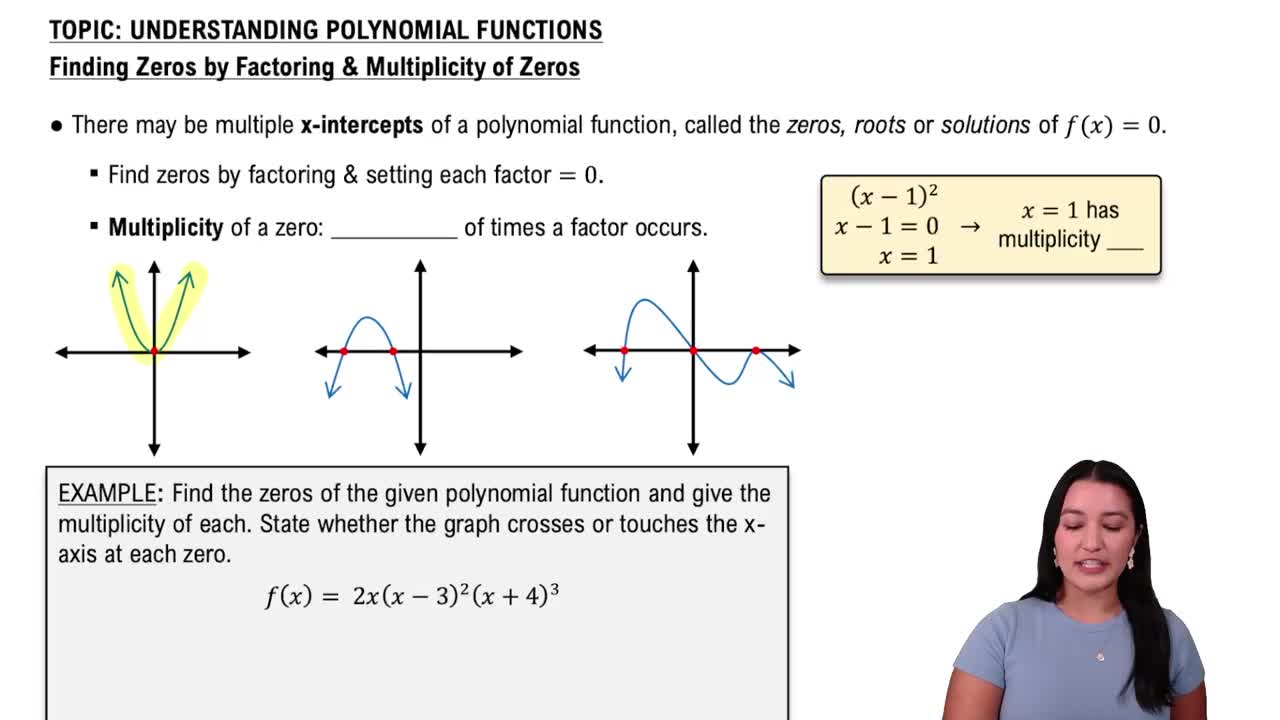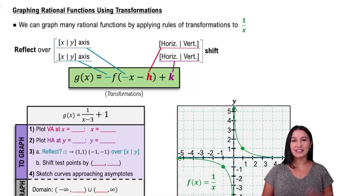Determine whether each statement is true or false. If false, explain why. For ƒ(x)=(x+2)4(x-3), the number 2 is a zero of multiplicity 4.
Table of contents
- 0. Review of Algebra4h 18m
- 1. Equations & Inequalities3h 18m
- 2. Graphs of Equations1h 43m
- 3. Functions2h 17m
- 4. Polynomial Functions1h 44m
- 5. Rational Functions1h 23m
- 6. Exponential & Logarithmic Functions2h 28m
- 7. Systems of Equations & Matrices4h 5m
- 8. Conic Sections2h 23m
- 9. Sequences, Series, & Induction1h 22m
- 10. Combinatorics & Probability1h 45m
4. Polynomial Functions
Zeros of Polynomial Functions
Problem 27
Textbook Question
Find an nth-degree polynomial function with real coefficients satisfying the given conditions. If you are using a graphing utility, use it to graph the function and verify the real zeros and the given function value. n=3; -5 and 4+3i are zeros; f(2) = 91
 Verified step by step guidance
Verified step by step guidance1
Identify the given zeros of the polynomial. Since the polynomial has real coefficients and one zero is complex (4 + 3i), its complex conjugate (4 - 3i) must also be a zero. So, the zeros are -5, 4 + 3i, and 4 - 3i.
Write the factors corresponding to each zero. For zero -5, the factor is \((x + 5)\). For zeros \$4 + 3i\( and \)4 - 3i\(, the factors are \)(x - (4 + 3i))\( and \)(x - (4 - 3i))$ respectively.
Multiply the complex conjugate factors to get a quadratic factor with real coefficients: \[(x - (4 + 3i))(x - (4 - 3i)) = (x - 4 - 3i)(x - 4 + 3i)\] Use the difference of squares formula to simplify this product.
Express the polynomial function as \(f(x) = a(x + 5)(x^2 - 8x + 25)\), where \(a\) is a real number constant to be determined.
Use the given function value \(f(2) = 91\) to find \(a\). Substitute \(x = 2\) into the polynomial and set the expression equal to 91, then solve for \(a\).
 Verified video answer for a similar problem:
Verified video answer for a similar problem:This video solution was recommended by our tutors as helpful for the problem above
Video duration:
7mPlay a video:
Key Concepts
Here are the essential concepts you must grasp in order to answer the question correctly.
Polynomial Zeros and Complex Conjugates
For polynomials with real coefficients, non-real zeros always come in conjugate pairs. Given a zero like 4 + 3i, its conjugate 4 - 3i must also be a zero. This ensures the polynomial remains with real coefficients when expanded.
Recommended video:

Complex Conjugates
Constructing a Polynomial from Zeros
A polynomial can be formed by multiplying factors corresponding to its zeros. For zeros r1, r2, and r3, the polynomial is f(x) = a(x - r1)(x - r2)(x - r3), where 'a' is a leading coefficient determined by additional conditions.
Recommended video:

Finding Zeros & Their Multiplicity
Using Function Values to Determine Leading Coefficient
Given a specific function value like f(2) = 91, substitute x = 2 into the polynomial expression and solve for the leading coefficient 'a'. This step ensures the polynomial satisfies all given conditions.
Recommended video:

Graphing Rational Functions Using Transformations
Related Videos
Related Practice
Textbook Question
380
views
1
rank
